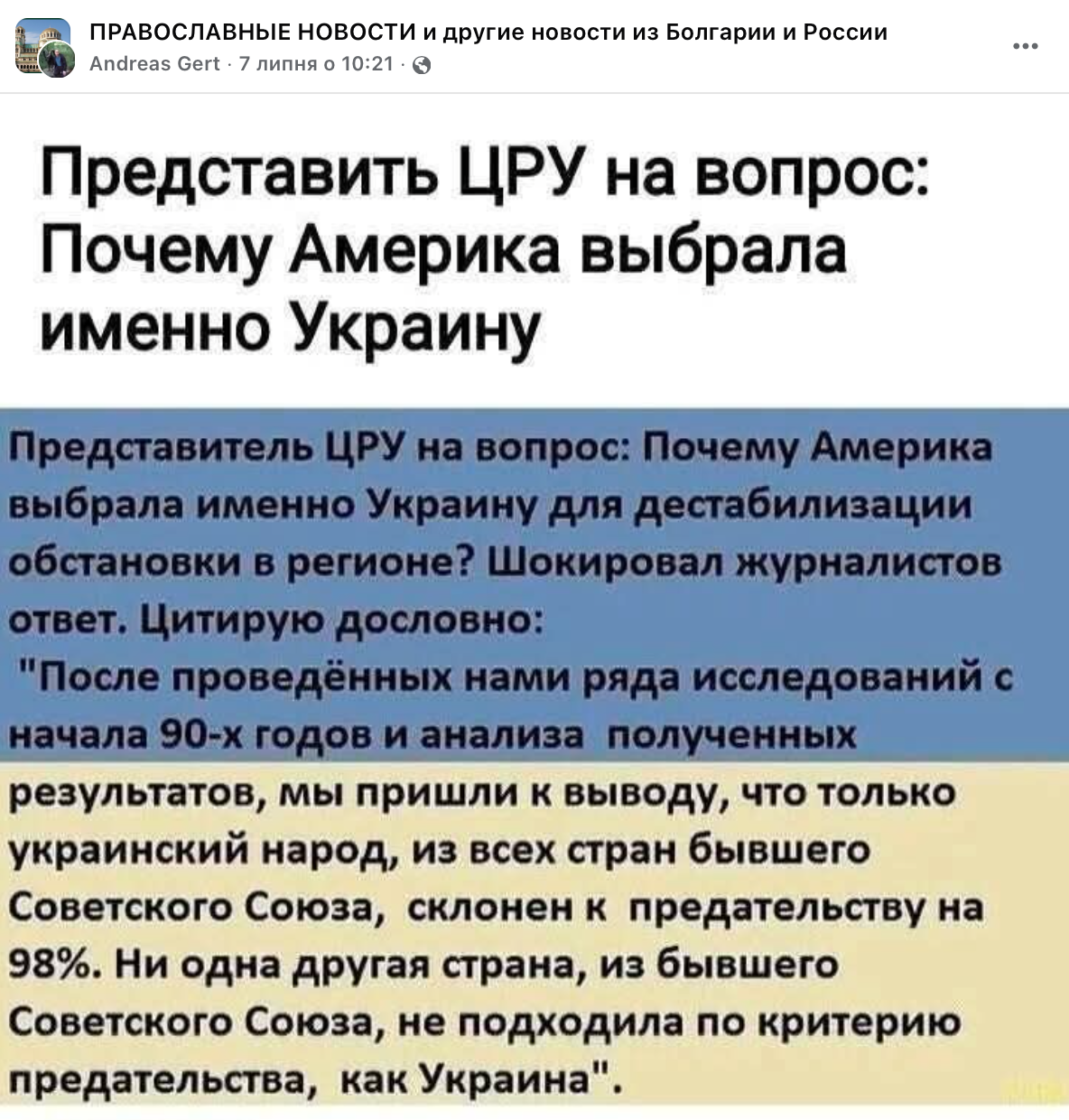Verification within Meta’s Third-Party Fact-Checking Program
Information is being spread online about an alleged response by an unnamed CIA representative to the question of why the US chose Ukraine “to destabilize the region”. He is quoted as saying: “After the studies we conducted in the early 1990s and the analysis of the data obtained, we concluded that of all the countries of the former USSR only Ukrainians are prone to betrayal by 98%. No country matched this criterion as much as Ukraine”.
This is a fake. There is no evidence in the public domain that this quote is real. In declassified CIA reports from those years, Ukrainian nationalism and the striving for subjectivity were never defined as “betrayal”.
Screenshot of the post
Did someone from the CIA really say this?
The post does not mention a specific CIA representative who allegedly made this statement, nor does it provide any other details about the studies. Searching in English using keywords (“betrayal” and synonyms, “98%”, “Ukrainians”, “former Soviet Union”, “CIA”) did not bring us to any relevant results. This quote does not appear in English-language sources, neither as genuine nor as an English version of a fake. We also did not find any mention of this quote in the Ukrainian-language segment. It likely exists only within the framework of Russian-language propaganda.
We found no records of press conferences, interviews, or any other public comments by CIA staff on this topic. Also, in declassified CIA archival materials there are no mentions of the “level of betrayal” of Ukrainians or a 98% figure.
Real CIA insights about Ukrainians
CIA analysts systematically studied and continue to study the political and social situation around the world. In particular, they researched nationalism in Ukraine, its characteristics and specifics, during the period when Ukraine was part of the USSR. In their reports, the CIA indeed often mentioned the pronounced aspiration of Ukrainians for self-determination and subjectivity, especially in the context of relations with Russia. However, they did not call this “betrayal”.
For example, in an archival Washington Post article from 1982, which relied on data from a classified CIA report, it was written:
“‘There is no area of the Soviet empire more important to Moscow than the Ukraine,’ a secret CIA report points out. Nor is there any area where nationalist fervor has persisted with more determination, and where the populace has more stubbornly resisted decades of attempted Russification. ‘The Ukrainians possess characteristics which, taken together, give them a unique position among Soviet minorities,” states the CIA report.
In this context, the CIA often described Ukrainians as “defiant” and threatening to the existence of the Soviet empire. In a 1991 report on forecasts for the development of the former Soviet Union countries, about Ukraine it was written: “We believe the ‘confederation’ scenario is less likely because of the unwillingness of many republics to cede some of their political sovereignty and power to a confederal government. Ukraine will be the key.”
That is, the CIA recognized the strong nationalist sentiment and Ukraine’s significant potential for separation and independence. However, it considered them only as political phenomena within the socio-political situation of that time, without any moral evaluation or the use of terms such as “betrayal.”
Why is it impossible to measure the exact “level of betrayal” of an entire ethnic group?
From a methodological point of view, the idea of measuring the “proneness to betrayal” of an entire people and expressing it as a percentage is problematic and highly unlikely. The construct of “betrayal” is a subjective moral and ethical concept that depends on many contextual factors and is practically not subject to quantitative measurement. Even if a survey were conducted, it would only reflect individual perceptions of betrayal, not an objective inclination toward it.
Attention
The authors do not work for, consult to, own shares in or receive funding from any company or organization that would benefit from this article, and have no relevant affiliations


